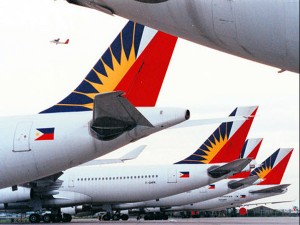
PAL plans to beef up its capital by another $500 million to $1 billion to fund a fleet modernization program. INQUIRER FILE PHOTO
Philippine Airlines plans to beef up its capital by another $500 million “in the near future” to fund a fleet modernization program intended to bring the storied flag carrier back to profitability amid a highly competitive environment.
PAL president Ramon S. Ang, who is also president of San Miguel Corp. (which now has management control of the airline), told reporters Monday night that on top of the $500-million fresh equity recently infused by SMC into PAL, further capital build-up was needed.
“We intend to raise up to $1 billion in equity and we already have $500 (million) and the intention is to raise an additional $500 million in the near future,” Ang told reporters Monday night during the launch of PAL’s newest aircraft, a Boeing 777-300ER.
“There are several ways to do it. Both shareholders—San Miguel and Lucio Tan group—can both raise another $250 million each or we can issue preferred shares,” he added. Preferred shares, which are usually non-voting, offer a fixed return to investors.
The additional capital raising would be done at the operating company level, Ang said, suggesting that PAL itself would raise the funds.
By implementing reforms in the airline, Ang said he would like to win the confidence of stockholders, referring to SMC’s partner, the Lucio Tan group of companies, which still owns majority of the airline even as the latter has ceded management control.
But while SMC was keen on infusing additional capital directly into PAL, Ang said this did not mean that SMC was aiming to get a majority control in the company.
“We have no plans to increase our stake. Our partner, Mr. (Lucio) Tan, is very, very good and the cooperation between the two groups is fantastic so I don’t see any need for us to increase our stake at the moment,” Ang said.
By building up the equity of PAL, the carrier is seen being in a position to tap more debt financing for its re-fleeting program. Ang envisions PAL to acquire 100 new aircraft and bring the flag carrier back to profitability after a year of SMC’s takeover.
Essentially, the business model being considered by SMC was for PAL to have a budget carrier cost structure but with comfortable seats like a full-service airline.
The problem of Category 2 rating by the US Federal Aviation Administration on the Philippines is seen being addressed if PAL were to invest in a regional airline. This, in turn, will allow PAL to generate synergy in operating the air operator’s certificates (AOCs) of these airlines going to the United States and Europe.